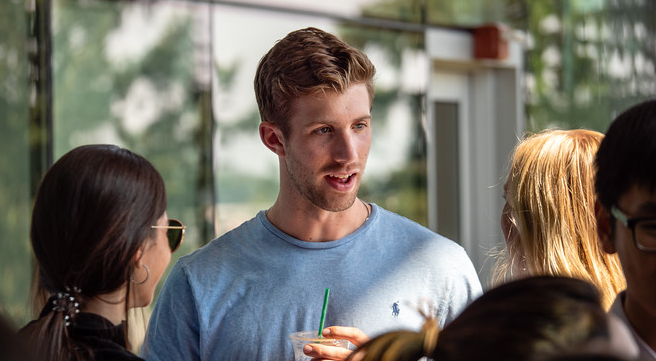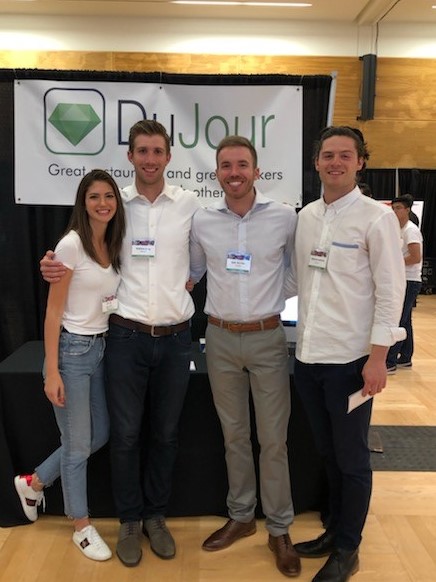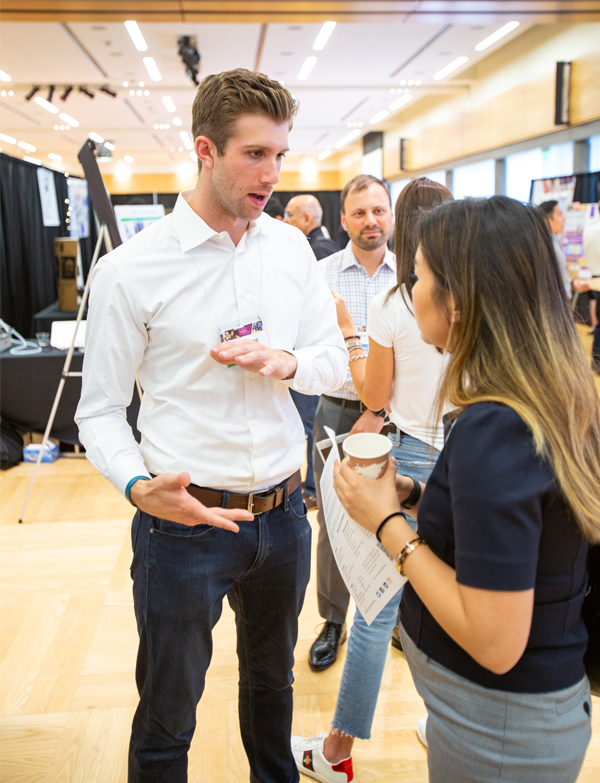Once an Entrepreneur, Always an Entrepreneur: How Master of Science in Entrepreneurship Alum Andrew Jung came to Found DuJour and GrillMe
Andrew Jung is the Co-Founder of the on-demand turned full-time hiring restaurant labor platform DuJour. An alumnus (’19) of the Master of Science in Entrepreneurship program, we recently got the chance to catch up with Andrew on a sunny day at his co-working space in the Columbia Tower Club. We discussed how he first landed on the entrepreneurial path, his deviation from the “normal” working world, and how the MS in Entrepreneurship program played a key role in the launch of his second company, DuJour.

A Sick Spell with an Unlikely Outcome
Andrew Jung never intended to enter the foodservice startup business—but then again, he also never intended to contract mononucleosis (“mono”) during his senior year of college. It was this opportune malady that jumpstarted Andrew’s career in entrepreneurship.
Any young adult afflicted with the misfortune of enduring mono knows that leaving the confines of a bed, much less leaving one’s living quarters to get food, is a near-impossible task. When Andrew found himself in this situation, he refused to let it stop him. Reframing this circumstance as a potential opening for a business venture, he decided to create a food delivery service app (now named GrillMe) that would allow him to virtually order his favorite fare and have it delivered to the entrance of his dorm room.
The Return to Entrepreneurial Roots
After graduating from Middlebury College with a dual degree in Economics and Computer Science in 2016, Andrew made the transition into a seemingly ideal job as a Financial Analyst at J.P. Morgan, which he had lined up prior to leaving his undergraduate studies. Almost two years went by before Andrew realized it wasn’t the right place for him.
He soon learned of the newly introduced MS in Entrepreneurship program and was intrigued. The entrepreneurial spark that had started in college was still alive, leading him to think this could be a great opportunity to dive all-in to entrepreneurship and grow his budding business skills. So, Andrew decided to go for it.
His college side-hustle, GrillMe, was (and still is, but under different ownership) going strong, but he didn’t necessarily look at the Entrepreneurship program as solely a tool to grow the company. In fact, between the time he had applied to and started the MS in Entrepreneurship in summer of 2018, Andrew had an entirely new idea. He steadily turned the prospect into DuJour, ultimately deciding to sell GrillMe during this period.
Today, Andrew can be found high up in the handsome working quarters of the iconic Seattle high rise, where he leads operations of the restaurant service and labor-matching company he founded in August of 2018, called DuJour, Inc.

DuJour is an evolving labor-matching platform which currently serves as a liaison between local restaurants seeking labor and food service workers seeking employment. After learning more about the intricacies of the foodservice industry through founding GrillMe, Andrew discovered that he wanted to explore another opportunity for improvement within this space. “Employment and workforce issues are a lot more interesting to me because it presents a much bigger problem to restaurants,” he said, reflecting on how the ever-growing restaurant industry is going to have an increasingly larger role in society as people come to lead busier and busier lives.
Leading as an MS in Entrepreneurship Student
Andrew says the MS in Entrepreneurship was not only instrumental in teaching him technical business skills, like pitching an idea and go-to-market strategies, but also in maintaining a necessary amount of accountability and community. He found the support systems and leadership-strengthening opportunities embedded within the program to be particularly impactful.
Ken Myer, who teaches Entrepreneurial Leadership among other classes in the Foster School, became a close mentor to Andrew. “I really like the [Entrepreneurial Leadership] course and Ken was spectacular at teaching it,” Andrew says. “I would call him all the time and ask for advice on what I was doing in the real world.” Learning to effectively lead was important for Andrew because he believes this skill is a highly underestimated ability that many see as a “soft-skill” or something that you can just wing. However, he was also inspired by the leadership reflected in students comprising his cohort, an attribute which he really valued within the MS in Entrepreneurship.

As Andrew sees it, “At the end of the day—if I’m going to start a company, no matter what my specific role is—I’m a professional leader. The ability to recruit and lead your team members is the indicating factor of your success.” He would know. DuJour has grown from a solo show to a team including a Lead Developer (“and Co-Founder of sorts”), various freelancers, and a board of three industry advisors in the past year.
The journey to an increasingly sustained business did not come without challenges, though. Andrew had a big momentum-builder in starting DuJour during the customer discovery process, in which he was able to sit down with Seattle restaurant titans Ethan Stowell, Tom Douglas, and Kurt Dammeier.
These conversations ultimately gave him the confidence to pursue an on-demand labor service. A great success—but then, the first failure came. After initially launching, his on-demand strategy proved ineffective when about 50% of the workers didn’t show up for their scheduled shifts with restaurants. It became obvious that accountability within the restaurant industry was an issue in need of addressing. “That was a failure and a really important one,” says Andrew. “It led me to what we are doing now: designing a system for automating the reference-checking process that will be built into a full-time hiring model.” With this necessary tribulation, the support of the program, and employment of pure grit, Andrew was well on his way to maintaining a viable venture.
Navigating Post-Graduation Life
Since graduating, Andrew notes that his anxiety levels have risen, but for good reason. He’s putting in the work and making big headway. Earlier this summer DuJour launched their first software, which was a milestone. Their partnership network continues to grow, with support from prolific Seattle restauranteurs on the horizon. Not to mention, he’s becoming more comfortable with being his own boss and setting his own hours, which is a mountain in and of itself.
Three Questions on Entrepreneurship
What is an entrepreneur in your eyes?
“An entrepreneur is someone who constantly recognizes gaps and is able to draw bridges across those gaps with whatever tools they have. For some people that is software…for others that is team building and constructive problem-solving. But an entrepreneur is someone who—money aside—is interested in solving problems.”
What are the advantages of entrepreneurship versus a more traditional career path?
“Our general schema of society right now is very focused on outcome-oriented and short-term pleasure, and what you can display on Instagram about your life. I think that entrepreneurship, as a young person particularly, helps you focus on a growth mindset and being unafraid of failure—seeking failure, even. And I think that’s a particularly good quality of an entrepreneur: someone who kind of revels in failure and isn’t necessarily afraid of it. If you’re a young person that is considering what to do and you don’t have any hardcore financial restrictions (i.e. a family, a house)…there’s no better way to learn critical life and business skills than just throwing yourself in there an doing it.”
What is your advice for first-time entrepreneurs struggling with self-doubt?
“Self-doubt is a constant battle that every entrepreneur—even Elon Musk—has. Because we’re all comparative beings, we all look at what our ‘tribe’ is doing and want to fit in. I’m a very methodical person, so the way I kind of limit that anxiety is by just constantly having my eyes set on: ‘what are the core assumptions I’m making right now about this idea and how do I get those addressed, to calm my nerves?’ A big thing for me is I always make sure that I’m heavily convicted but lightly held. I have a hypothesis. And, as an entrepreneur you’re just basically a business scientist—you’re experimenting—so you must be convicted about something. You have to be dedicated to what you think, but as soon as you have critical evidence that it’s not true, you’re an idiot if you stay stubbornly on that path.”
We’re Dying to Know…
Favorite app?
Fitmind—basically it’s a new twist on a meditation app, and Fitmind is a company that my friend Liam started, with the goal of modernizing meditation for our society and making it accessible as a practice but being both process and results oriented at the same time.
Most likely place to be brainstorming new hypotheses?
Most of it comes to me when I’m not trying. In my workplace I’m inherently trying. So, in my bed, in the car. Really good ideas are created when you’re alone, bad ideas are weeded out when you’re together.
Finish this sentence: My workspace is not complete without…
An indoor plant.
Best medium to get your entrepreneurial news fix?
Techcrunch, How I built This, The Pitch.
Must-follow person on the internet?
Gary Vaynerchuk.
What section do you gravitate towards in the bookstore?
I don’t want to say self-help because that sounds weird. But I like reading stuff where I can read a small bit and then go act on it. So yeah, self-help, you can put that in there.
